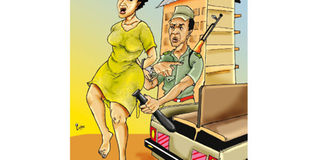Makerere lecturer disappeared over aiding Museveni

Makerere University lecturer Beatrice Kemigisha was arrested and disappeared nearly 40 years ago.
She was suspected of being a member of the National Resistance Army (NRA) rebel group that was led by Yoweri Museveni, now President of Uganda.
Kemigisha was last seen at the Nile Mansions, now Kampala Serena Hotel, and was later reportedly taken for interrogation at Wandegeya Police Station, according to an eye witnesses who was arrested with her in 1981.
The Amnesty International reports on Uganda for 1982, 1983, 1984 and 1985 indicate that Kemigisha was arrested by security personnel and was never seen again. Then president Milton Obote’s government was internationally condemned for violation of human rights and extra-judicial killings.
From when Yoweri Museveni launched the Luweero Bush War on February 6, 1981, victims of assassinations and extra-judicial were often suspected of being rebels or NRA supporters.
Kemigisha arrested
On September 10, 1981, Kemigisha, a lecturer in Educational Psychology, was arrested from her official residence at the Makerere Lincoln Flats, the Amnesty International report of Uganda of 1982 indicates in their investigations about Kemigisha’s disappearance.
The report indicates that from Makerere, she was taken to Wandegeya Police Station for interrogation. Kemigisha was accused of being an NRA rebel supporter and Museveni’s accomplice.
The report further indicates that from Wandegeya, she was possibly taken to Kireka Military Barracks where she was killed during interrogation.
“When a person is arrested and is feared ‘disappeared,’ relatives who attempt to trace his or her whereabouts must inquire at all possible places of detention and with all relevant authorities – Ministry of Justice, Ministry of Internal Affairs and Ministry of Defence,” the report reads in part.
“For example, the brother of Beatrice Kemigisha, a university lecturer, who disappeared in 1981 and was reportedly killed by the army in custody, was himself reportedly arrested by the military.”
Clues emerge
Seven years after Kemigisha’s disappearance and subsequent death, information started emerging on how she was arrested. It was revealed by a person who said he was arrested with Kemigisha.
When Museveni came to power in January 1986, his government established a judicial commission of inquiry.
The inquiry was to investigate the violation of human rights in Uganda from October 9, 1962, to January 25, 1986.
The commission was chaired by Justice Arthur Oder. Some of the committee members included counsel Edward Ssekandi, now Vice President of Uganda, John Nagenda, now a senior Presidential Advisor on Media and Public Relations, Joan Kakwenzire and John Kawanga, a young brother of former Democratic Party president Paul Ssemogerere.
It was from this commission of inquiry that the Uganda Human Rights Commission was re-born.
It was first established in 1977 during the Idi Amin government after the Justice Feud inquiry into violation of human rights in Uganda.
On June 29, 1988, Ms Helen Kiwanuka Baweto, an eye witness, was called by the commission to testify. She was an NRA soldier (RA:71895).
A week earlier, Baweto’s half-brother, Mr Kenneth Kwesiga, had testified before the commission.
During his testimony, Kwesiga said he suspected Baweto might have made false allegations against him and his sister Kemigisha that they were NRA guerrillas, which led to their arrest and subsequent disappearance of Kemigisha. Kwesiga was an employee of the President’s Office in 1988.
Baweto responds
In her response, Baweto described Kwesiga’s allegations as sheer concoctions motivated by family grudges.
Baweto told the commission that their mothers were co-wives who were never on good terms.
However, on further cross examination, Baweto admitted that she was a UPC activist while Kemigisha and Kwesiga were Uganda Patriotic Movement (UPM) supporters.
She also admitted that at the time Kemigisha was arrested Baweto and Kemigisha were both staying at Lincoln Flats.
Baweto further revealed that Kemigisha was at the time of her arrest the girlfriend of Maj Gen David Oyite-Ojok, the chief of staff of the Uganda National Liberation Army (UNLA).
Baweto also told the commission that at the time she was the girlfriend of Masette Kuuya, the minister of Rehabilitation, who was also chairman of the National Council of Sport and UPC national treasurer.
Kwesiga was at the time the UPM chairman at Makerere University. Museveni was the UPM presidential candidate in the December 1980 general election.
Baweto went on to inform the commission that she too was arrested on the same day Kemigisha and Kwesiga were arrested and was also taken to Wandegeya Police Station for interrogation.
From Wandegeya, they were taken to the Nile Mansions from where she says she doesn’t know what happened to Kemigisha and Kwesiga.
Ssekandi pins Baweto
When Baweto indicated that she too was a victim of the circumstance, commissioner Ssekandi presented her with a typed document purported to have been written by her on June 11, 1981. However, the statement was not signed.
Baweto denied any knowledge of the document that alleged that Museveni had visited Kemigisha’s home one night in the presence of Baweto.
The statement further claimed that before her arrest, Kemigisha, accompanied by Baweto, had attended a party at Lungujja, Mengo, at which Museveni and six White men were present.
Baweto said the document was a concoction because she too was arrested and detained on suspicion of being an NRA spy.
In the end, her boyfriend, Masette Kuuya, turned against her and refused to provide any assistance. Baweto mentioned that fellow NRA soldiers Flavia and Aida too had UNLA soldier boyfriends would bear her witness.




